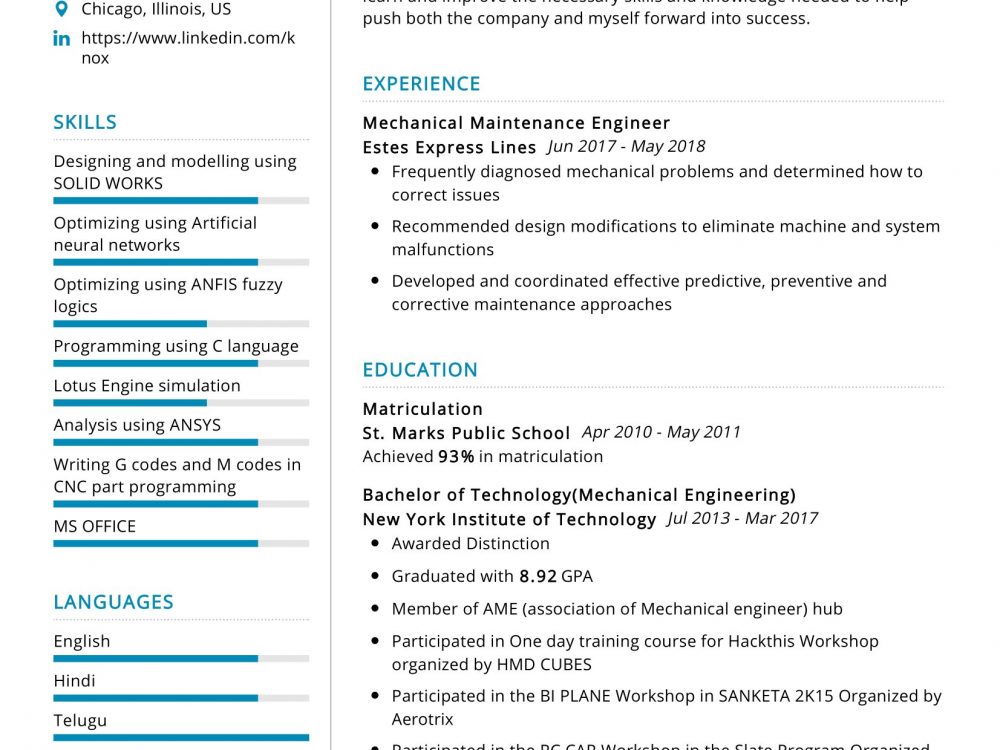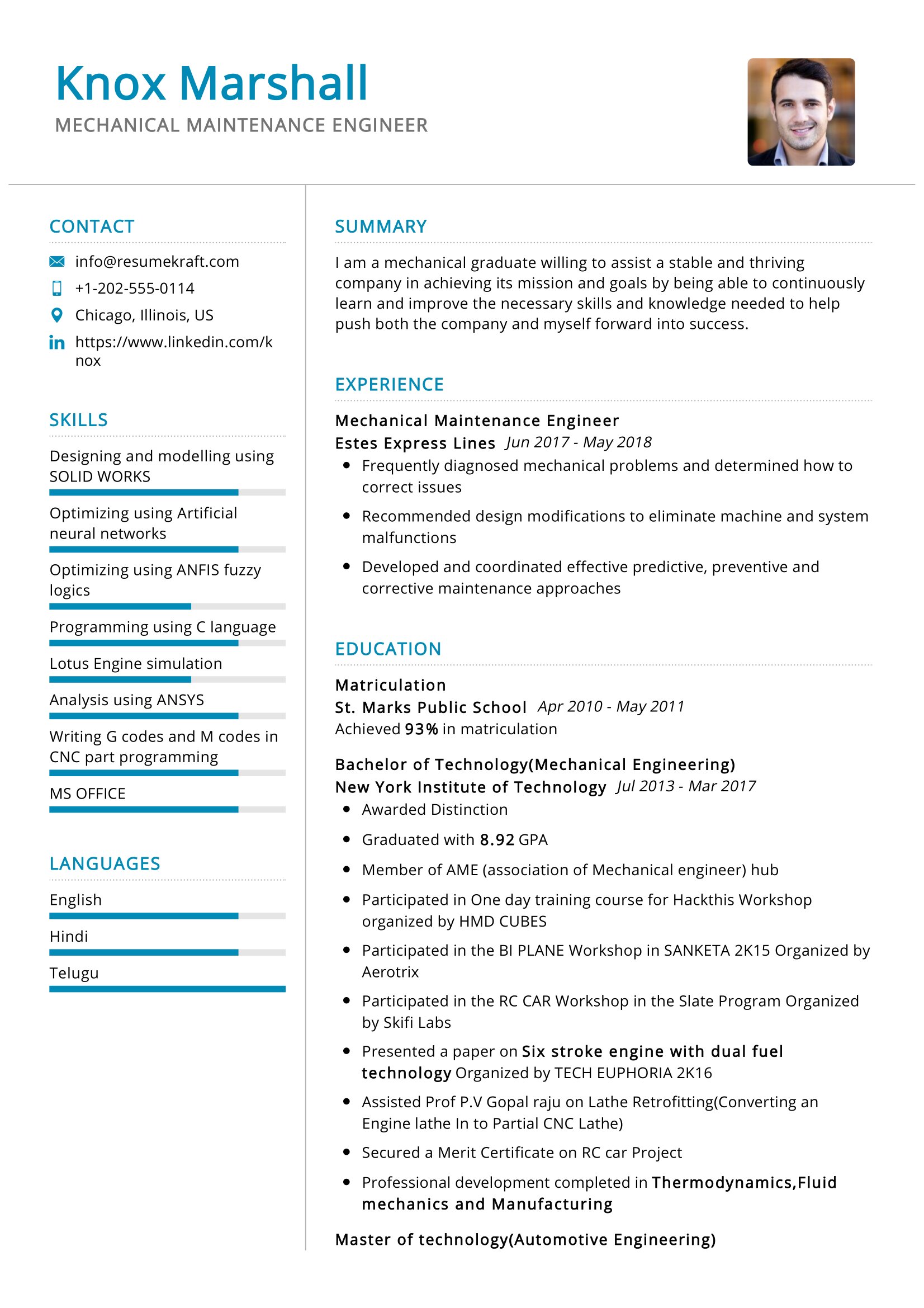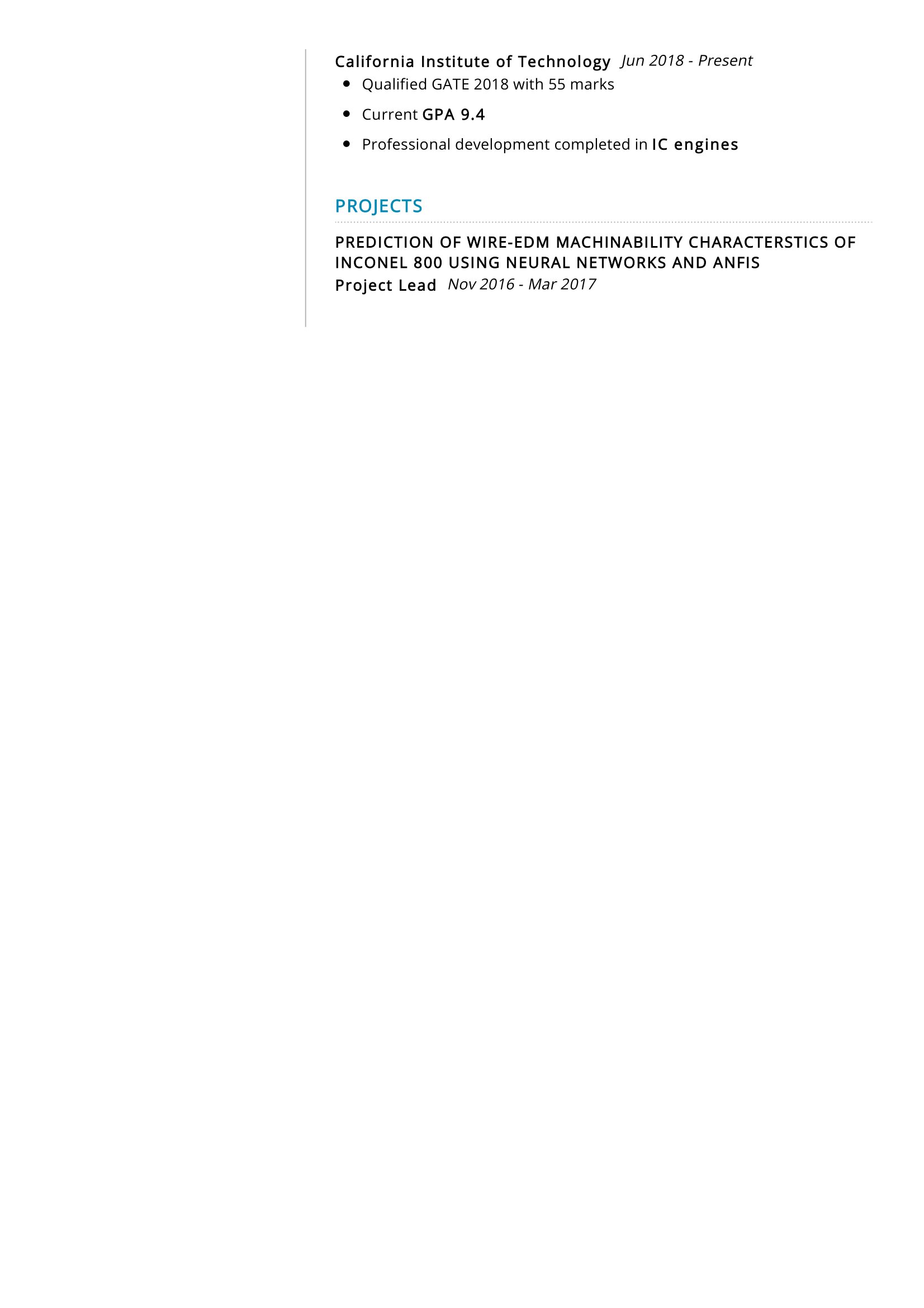Maintenance Engineer Resume with Writing Guide
An effective Maintenance Engineer Resume will help you best showcase your skills and experience, leading to more interviews. This guide includes a resume template with instructions for filling out all relevant sections.
Maintenance Engineer Resume Template is free to use. To allow for modification of the text in the template, we request that you include a link (without copying) to this page. We always encourage our users to change the text in our templates as needed, so please do not copy directly from our templates.
Maintenance Engineer Resume Writing Guide:
This guide has been prepared by the students and staff of our online training course, Professional Skills for the Maintenance Technician. This is a low-cost online course that teaches you skills that can be used immediately upon completion.
This guide is designed to aid with your resume writing, but all of the advice presented here should be kept simple and strict: make it easy for hiring managers and recruiters to understand who you are and what you have to offer.
The core techniques are highlighted in bold here.
Resume Objective: Your resume objective should be short and crisp, but make it clear who you are and what you can bring to the table.
Resume Summary: The most important section of your resume, this should be no more than two or three sentences.
Professional Experience: This is your chance to showcase your experience! List the types of work you have done, in chronological order – it’s easy for a recruiter to skip this section if they want to.
Education: List your education in reverse chronological order. The most recent item should be first.
Education Summary: Include a brief overview of your education here – including grades, degrees earned and major(s).
Skills: List all of the skills relevant for the job you are applying to. If you don’t have work experience specific to the job, this is a good place to put your other skills.
Additional Info: Use this section to list any other relevant information which is not covered by other sections on your resume.
Professional Skills Training Courses: This is the place to brag about what you learned! List all of the courses here that are relevant for the job.
References: Here you can put your contact information and a list of references.
Engineer Responsibilities:
- Solve problems in the areas of civil and electrical consulting, industrial and mechanical engineering, and industrial automation.
- Maintain a large portfolio of working contracts with emphasis on customer relationship management.
- Provide functional support to outside vendors (contractors) for internal projects.
- Provide high level technical expertise on a variety of technologies or fields pertaining to the scope of work required by their team in conjunction with other engineers on their team or higher up the company ladder.
- Assist other engineers and the management team with problem resolution.
- Perform research into and development of processes and technologies, work to maintain and improve existing systems, or formulate new policies or processes.
- Collaborate with others on their team or higher up the company ladder in order to develop new technical services, products, and procedures.
- Adhere to and adhere to company policies and procedures.
- Complete the tasks outlined in his job description, as well as meetings with management and other department as directed by management.
- Work under direct supervision from a team lead or supervisory engineer with a team of engineers.
Top 10 Must-have Maintenance Engineer Skills:
- Troubleshooting – Troubleshooting is the art of fixing problems. As a maintenance engineer you’ll need to be able to pinpoint and fix issues in a variety of machinery.
- Problem Solving – If the problem with machinery isn’t easily identified instead of just guessing you’ll need to be able to try multiple solutions till you find one that works.
- Critical Thinking– This involves actively thinking about situations and analyzing how things work (or how they can be made to work). As a maintenance engineer you’ll need to make decisions based on the information you have available.
- Monitoring – Continuous monitoring means to check things over often (and often is continuous). Strongly linked with problem solving, as a maintenance engineer you’ll be constantly evaluating systems and equipment to see if they are effective and working as expected.
- Safety– This includes both observing for safety compliance (like keeping the space clean) and also taking care of your own safety (like knowing how to use tools safely).
- Communication – Like all of the maintenance engineer skills, communication is important for many different reasons. As a maintenance engineer you’ll need to be able to convey information clearly and accurately.
- Organizing – This includes getting things done before they are due and making sure that work is being completed and followed up on properly with customers.
- Organizing– This includes getting things done before they are due and making sure that work is being completed and followed up on properly with customers.
- Monitoring – As a maintenance engineer you’ll need to monitor equipment, safety, and other systems to ensure that everything runs as it should.
- Troubleshooting – One of the more common skill used by Maintenance Engineer is troubleshooting. It is the art of fixing what is broken.
Most Common Maintenance Engineer Skills:
As shown above there are many different skills that a maintenance engineer should possess and know how to use, but some of the more common skills include:
- Troubleshooting
- Problem-Solving
- Organizing
- Monitoring
- Communication
- Safety – Both personal and in regards to company policies and procedures!
Tips to write a Maintenance Engineer Resume Summary:
- Utilize the space on the first page of your resume to make your skills and experience jump off the page.
- Use strong action verbs in the “professional experience” section of your resume, such as initiated, developed, increased, managed, directed, created and led.
- List out all previous jobs in chronological order. Employers like to see a steady employment history.
- Organize your job titles and job descriptions in a way that makes sense for a specific employer.
- Use action verbs to describe your skills and responsibilities.
- Edit and proofread your resume before you send it out. Avoid grammatical errors, typos and poor layout.
- Have a cover letter ready to go when you send your resume to an employer.
- The cover letter is the perfect place to highlight the strong points in your resume, as well as demonstrate how you would be a good fit for the job position at hand.
How to write a Maintenance Engineer Resume with No experience:
- Always include a cover letter for your resume.
- Use an easy to read font, such as Arial, Lucida Sans, Helvetica or Georgia.
- Include your contact information on the top of the page and add a section titled “Objective.”
- After the contact section you should have a skills section (should include all of your skills). You should also include a “Work Experience” section.
- In the work experience section focus on skills, not job duties. Also, you should be able to elaborate further on your skills in the “Experience” section. Don’t say that you are good at MS Word if you have 10 years of experience with it and have achieved mastery of it. Don’t use acronyms unless they are well known and easily recognizable by potential employers (i.e.: MS Office).
How to write a Maintenance Engineer Cover Letter:
For the purpose of this guide, the term “cover letter” will refer to any letter that is sent with your resume. It is extremely important that the cover letter be tailored specifically to each individual interested in your job. The cover letter does not have to be written by you. This portion of your job search should be handled by professionals who can best write the ideal cover letters for you. Look for career and resume writing services in your area.
The first section of the letter should be written to sell the reader on why they should want to hire you. This is usually done with a strong opening such as “You are probably wondering why I am applying for the position of Maintenance Engineer…” or “As an applicant with over ten years of experience, I am sure you will be interested to learn the most popular reasons employers utilize hiring Maintenance Engineers. ”
The second section of the cover letter is usually a bit longer. This is where you can discuss your past and present employment experiences as well as general achievements such as community service, volunteer opportunities and responsibilities, etc. There are some situations that call for a more detailed explanation of achievements. For example, if you were hired from outside the organization, you should not only talk about the duties you had but also bring attention to why you left your previous job.
Key Takeaways:
- Tailor your resume to each job position
The main principles of resumes are to: a) stress the skills that match the position and b) make sure the resume is within the guidelines of length. - Customize your resume for each job you apply for
You will be writing a new resume for every job that you apply and interview for. The key is to highlight your skills as specifically as possible while still being concise. Your goal should be to list only what is relevant for each job. - Stay true to your experience
You want to make sure that the information you put down is completely applicable to the job being applied for. You want to show that your previous jobs are relevant and truly reflect your experience, not just a list of random tasks or duties you have been involved in.



